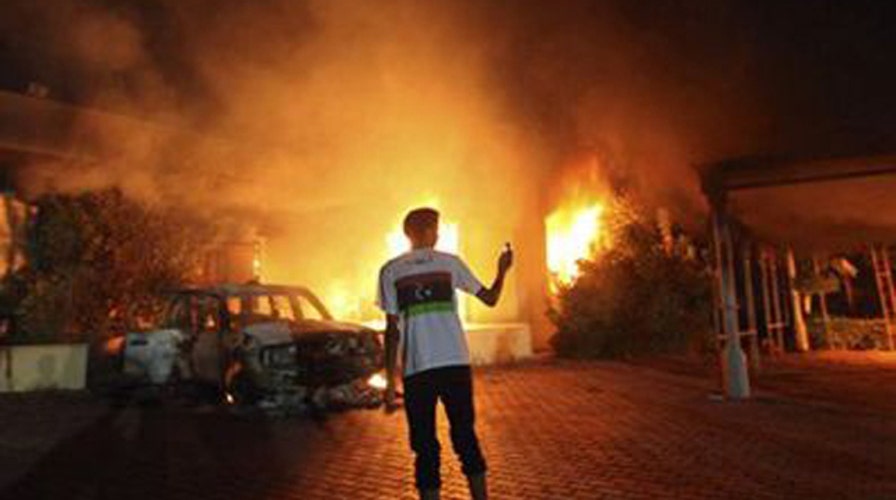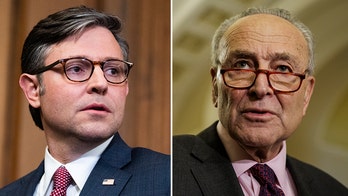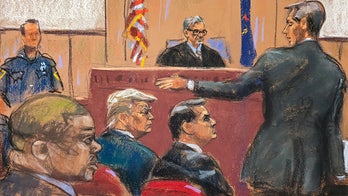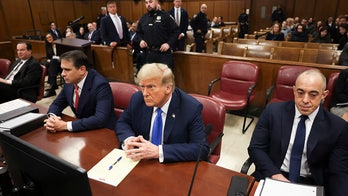Benghazi investigation:Questions that still need to be asked
Ambassador John Bolton says understanding what went wrong in Libya is important to our security
WASHINGTON – State Department officials repeatedly objected to -- and tried to water down -- references to Islamic extremist groups and prior security warnings in the administration's initial internal story-line on the Benghazi attack, according to dozens of emails and notes released by the White House late Wednesday.
The documents also showed the White House, along with several other departments, played a role in editing the so-called "talking points," despite claims from the White House that it was barely involved. And they showed then-CIA Director David Petraeus objected to the watered-down version that would ultimately be used as the basis for U.N. Ambassador Susan Rice's flawed comments on several TV shows the Sunday after the attack.
"Frankly, I'd just as soon not use this," Petraeus told his deputy in a Sept. 15 email.
The documents were released under pressure after whistle-blowers testified on the Hill and some email excerpts leaked to the media last week.
The 100-page file showed that State Department officials were even more heavily involved in editing the "talking points" than was previously known.
One email sent the Friday night after the attack from an unknown official said: "The State Department had major reservations with much or most of the document."
Individual emails leading up to that assessment show State officials repeatedly objecting to the intelligence community's early version of events.
The early versions stated that "Islamic extremists with ties to Al Qaeda" participated in the assault and discussed links to militant group Ansar al Sharia -- and referenced prior attacks against western targets in Benghazi, as well as intelligence warnings.
State Department spokeswoman Victoria Nuland complained that she had "serious concerns" about "arming members of Congress" to make assertions the administration was not making. "In same vein, why do we want Hill to be fingering Ansar al Sharia, when we aren't doing that ourselves until we have investigation results ... and the penultimate point could be abused by Members to beat the State Department for not paying attention to Agency warnings so why do we want to feed that either? Concerned ..."
She also wrote that the line saying the administration knows there were extremists among the demonstrators "will come back to us at podium," voicing concern that some would question how the administration knows that. She said she would "need answers" if that line is used.
In response to her concerns, Assistant Secretary of State David S. Adams voiced agreement. He said the line about prior incidents "will read to members like we had been repeatedly warned."
The emails show Petraeus' deputy Mike Morell involved in circulating revised points. In one email, he too noted the State Department had "deep concerns" about referencing prior "warnings."
A page of hand-written notes showed Morell scratching out mentions of Al Qaeda, the experience of fighters in Libya, Islamic extremists and a warning to the U.S. Embassy in Cairo on the eve of the attacks of calls for a demonstration. Ultimately, all of that was scrubbed from the talking points. The final version said "extremists" participated, without mentioning prior attacks and warnings in the region.
Petraeus specifically complained about the removal of the line about the warning to Cairo. That is when he said he'd rather not use the talking points, but acknowledged it wasn't his call.
Senior administration officials told reporters Wednesday that Morell made the changes to the talking points because of his own concerns that they could prejudge an FBI investigation into who was responsible for the Sept. 11, 2012, attack that killed U.S. Ambassador Chris Stevens and three other Americans.
The emails also show Deputy National Security Adviser Ben Rhodes was alerted that the intelligence community was drafting the memo, as well as National Security Council spokesman Tommy Vietor.
As late as 3:04 p.m. on Friday, the points still included references to extremists tied to Al Qaeda and an "attack."
The terms "Al Qaeda" and "attack" were stripped by 4:42 p.m. Senior administration officials indicated Wednesday these terms were dropped after internal CIA deliberations.
Shortly afterward, Vietor thanked colleagues for revisions and said they would be vetted "here," as in the White House. He then forwarded "edits" from John Brennan, the current CIA chief who then was a White House counterterrorism adviser.
Rice would go on to say the attack was triggered by protests over an anti-Islam film, leaving out references to Islamic groups and prior warnings.
The talking points did show all along that the intelligence community believed at the time that the "demonstrations" in Benghazi were "spontaneously inspired" by protests in Cairo. Officials later acknowledged there was no protest in Benghazi at the time, though officials and lawmakers continue to argue over what role -- if any -- the Cairo protests had in inspiring the attack on the Benghazi post. Many Republicans say the two were largely unrelated.
After the emails were released, a spokesman for House Speaker John Boehner said they confirmed what House investigators had earlier alleged - that senior State Department officials watered down the talking points. He also said they "contradict" White House claims that it and State only changed one word.
"The seemingly political nature of the State Department's concerns raises questions about the motivations behind these changes and who at the State Department was seeking them," Buck said, while calling the document dump "long overdue."
The White House had until now declined to make the documents public and had let congressional investigators review the documents without making copies.
A senior intelligence official told Fox News that the CIA was the agency that reviewed the documents and “declassified information for release to the public.”
The Associated Press contributed to this report.




